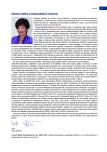-
Medical journals
- Career
Atrial fibrilation and diabetes mellitus
Authors: Anna Vachulová
Authors‘ workplace: Oddelenie arytmií a kardiostimuláce, Klinika kardiológie a angiológie, NÚSCH a. s., Bratislava
Published in: Forum Diab 2017; 6(3): 141-145
Category: Topic
Overview
Atrial fibrillation and diabetes mellitus are both highly prevalent and global public health issues. Importantly patients with diabetes mellitus are at increased risk for stroke when atrial fibrillation is present, and diabetes is thus part of stroke risk prediction tools.
Key words:
atrial fibrillation, diabetes mellitus, stroke, NOACs, non - vitamin K Antagonists
Sources
1. Kirchhof P, Benussi S, Kotecha D et al. 2016 ESC Guidelines for the management of atrial fibrillation developed in collaboration with EACTS. Eur Heart J. 2016; 37(38): 2893–2962. Dostupné z DOI: <http://dx.doi.org/10.1093/eurheartj/ehw210>.
2. 2013 ESC Guidelines on diabetes, pre - diabetes, and cardiovascular diseases developed in collaboration with the EASD: the Task Force on diabetes, pre-diabetes, and cardiovascular diseases of the European Society of Cardiology (ESC) and developed in collaboration with the European Association for the Study of Diabetes (EASD). Eur Heart J 2013; 34(39): 3035–3087. Dostupné z DOI: <http://dx.doi.org/10.1093/eurheartj/eht108>. Erratum in Eur Heart J 2014;35(27): 1824.
3. Goudis C.A, Korantzopoulos P, Ntalas IV et al. Diabetes mellitus and atrial fibrillation: Pathophysiological mechanisms and potential upstream therapies. Int J Cardiol 2015; 184 : 617–622. Dostupné z DOI: <http://dx.doi.org/10.1016/j.ijcard.2015.03.052>.
4. Sun Y, Hu D. The link between diabetes and atrial fibrillation: cause or correlation? J Cardiovasc Dis Res 2010; 1(1): 10–11. Dostupné z DOI: <http://dx.doi.org/10.4103/0975–3583.59978>.
5. Piepoli MF, Hoes A.W, Agewall S et al. 2016 European Guidelines on cardiovascular disease prevention in clinical practice (constituted by representatives of 10 societies and by invited experts)Developed with the special contribution of the European Association for Cardiovascular Prevention & Rehabilitation (EACPR). Eur Heart J 2016; 37(29): 2315–2381. Dostupné z DOI: <http://dx.doi.org/10.1093/eurheartj/ehw106>.
6. Dublin S, Glazer NL, Smith BM et al. Diabetes mellitus, glycemic control and risk of atrial fibrillation. J Gen Intern Med 2010; 25(8): 853–858. Dostupné z DOI: <http://dx.doi.org/10.1007/s11606–010–1340-y>.
7. Andersen KK, Olsen TS, Dehlendorff C et al. Hemorrhagic and ischemic strokes compared: stroke severity, mortality, and risk factors. Stroke 2009; 40(6): 2068–2072. Dostupné z DOI: <http://dx.doi.org/10.1161/STROKEAHA.108.540112>.
8. De Sensi F, De Potter T, Cresti A et al. Atrial fibrillation in patients with diabetes: molecular mechanisms and therapeutic perspectives. Cardiovasc Diagn Ther 2015; 5(5): 364–373.Dostupné z DOI: <http://dx.doi.org/10.3978/j.issn.2223–3652.2015.06.03>.
9. Patten M, Maas R., Karim A et al. Event-Recorder Monitoring in the Diagnosis of Atrial Fibrillation in Symptomatic Patients: Subanalysis of the SOPAT Trial J. Cardiovasc Electrophysiol 2006; 17(11): 1216–1220.
10. Hart RG, Benavente O, McBride R et al. Antithrombotic therapy to prevent stroke in patients with atrial fibrillation: a meta-analysis. Ann Intern Med 1999; 131(7): 492–501.
11. Apostolakis S, Sullivan RM, Olshansky B et el. Factors affecting quality of anticoagulation control among patients with atrial fibrillation on warfarin: the SAM-e - TT2R2 score. Chest 2013; 144(5): 1555–1563. Dostupné z DOI: <http://dx.doi.org/10.1378/chest.13–0054>.
12. Ruff CT, Giugliano RP, Braunwald E,et al. Comparison of the efficacy and safety of new oral anticoagulants with warfarin in patients with atrial fibrillation: a meta-analysis of randomised trials. Lancet 2014; 383(9921): 955–962. Dostupné z DOI: <http://dx.doi.org/10.1016/S0140–6736(13)62343–0>.
13. Heidbuchel H, Verhamme P, Alings M et al. EHRA Practical Guide on the use of new oral anticoagulants in patients with non-valvular atrial fibrillation: executive summary. Eur Heart J 2013; 34(27): 2094–2106. Dostupné z DOI: <http://dx.doi.org/10.1093/eurheartj/eht134>.
14. Connolly SJ, Ezekowitz, MD, Phil. D, et al. Dabigatran versus Warfarin in Patients with Atrial Fibrillation. N Engl J Med 2009; 361(12): 1139–1151.
15. Connolly SJ, Wallentin L, Yusuf S. Additional Events in the RE-LY Trial. N Engl J Med 2014; 371(15): 1464–1465. Dostupné z DOI: <http://dx.doi.org/10.1056/NEJMc1407908>.
16. Brambatti M, Darius H, Oldgren J et al. Comparison of dabigatran versus warfarin in diabetic patients with atrial fibrillation: Results from the RE-LY trial. Int J Cardiol. 2015;196 : 127–131. Dostupné z DOI: <http://doi 10.1016/j.ijcard.2015.05.141>.
17. Halperin JL, Bloomgarden Z, Hellkamp A et al. Abstract 15544: Rivaroxaban compared with warfarin in patients with atrial fibrillation and diabetes: a subgroup analysis of the ROCKET AF Trial. Circulation 2012; 126: A15544. Dostupné z WWW: <http://circ.ahajournals.org/content/126/Suppl_21>.
18. Ezekowitz JA, Lewis BS, Lopes RD et al. Clinical outcomes of patients with diabetes and atrial fibrillation treated with apixaban: results from the ARISTOTLE trial. Eur Heart J Cardiovasc Pharmacother 2015;1(2): 86–94. Dostupné z DOI: <http://dx.doi.org/10.1093/ehjcvp/pvu024>.
Labels
Diabetology Endocrinology Internal medicine
Article was published inForum Diabetologicum

2017 Issue 3-
All articles in this issue
- Fourier Study: Has it brought little or a lot of good? Or has it just failed to reach exaggerated expectations?
- Diabetes mellitus and cerebrovascular diseases
- Management of cardiovascular risk in the light of current recommendations
- Transcutaneous oxymetry – its contribution to diabetic management
- Atrial fibrilation and diabetes mellitus
- Pharmacological management of diabetic dyslipidaemia
- Relationship of diabetes mellitus and aortic aneurysms
- Rehabilitation in diabetic patients
- Benefit of SGLT2 inhibitors in diabetes mellitus type 2
- Forum Diabetologicum
- Journal archive
- Current issue
- Online only
- About the journal
Most read in this issue- Rehabilitation in diabetic patients
- Management of cardiovascular risk in the light of current recommendations
- Diabetes mellitus and cerebrovascular diseases
- Fourier Study: Has it brought little or a lot of good? Or has it just failed to reach exaggerated expectations?
Login#ADS_BOTTOM_SCRIPTS#Forgotten passwordEnter the email address that you registered with. We will send you instructions on how to set a new password.
- Career

